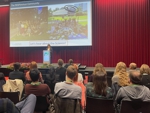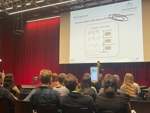|
2022; 10 (1): |
20 September 2022
Section of Physiology and Pathophysiology, Otto Loewi Research Centre, Medical University of Graz, Austria
On the 20th of September 2022, one year of the RESPImmun PhD program [1] was celebrated as part of the first program retreat, which took place at the MedCampus Aula of the Medical University Graz.
The two program speakers, Grażyna Kwapiszewska and Ákos Heinemann, reviewed the initial year of the program and dived into first scientific achievements by our 16 PhD candidates. They furthermore looked into the future and welcomed three additional students who will join the program in October.
It was a great pleasure to have Elke Heinrichs, who welcomed all participants as a representative of the City of Graz and started the first session (Fig. 1).

|
Figure 1: Elke Heinrichs welcomes all participants as representative of the City of Graz.
Click on the figure icon to see higher resolution |
The sessions
During the sessions, all young researchers had the chance to talk about their PhD project work (Fig. 2). The PhD candidates’ research of the past year was shown and vividly discussed with all faculty members and participants right after each presentation. The topics covered a wide spectrum of lung research, from how the molecular circadian clock might influence asthma to various aspects of COPD, fibrosis and lung cancer. Furthermore, the analysis of the microbiome in respiratory disorders and many elements of inflammation in pulmonary diseases as well as gluconeogenesis in tumor-promoting macrophages, potential anti-inflammatory properties of novel apolipoprotein mimetics and pulmonary hypertension in chronic lung diseases were discussed.

|
Figure 2: Thi Huyen Phan presenting her work.
Click on the figure icon to see higher resolution |
In the course of the event, all RESPImmun faculty members and PhD students voted for the best presenter of the congress. One award was given by the faculty and one prize was awarded by the students at the end of the day. At this point it should be noted that the large amount of high-quality data presented after just one year of research was impressive and it will be very interesting to hear about the progression and further development of the projects soon.
Panel discussions with patients
After the first session and a short coffee break to connect, one of our event’s highlights followed: a panel discussion with lung patients.
For this part of our event we welcomed three lung patients from Austria, and it was more than interesting to hear about their view on basic research in the field of lung diseases. They shared how their respective diagnosis (chronic obstructive pulmonary disease, idiopathic fibrosis and sarcoidosis) changed how they perceived research as they got more and more in touch with scientists to ask detailed questions.
It was absolutely motivating for all researchers who were present to hear about the impact their work can have and the difference their effort can make for patients. For instance, the patients emphasized how important it was for them to learn about what is happening in research in order to find hope and look optimistically into their future. They do not feel left alone when hearing what researchers are working on constantly to improve their situation. Thus, communicating lung research seems to be crucial for the patients’ well-being and even their willingness to adhere to particular treatments. Our guests underlined how important it is to understand underlying mechanisms in order to keep taking medications even at times when they might have unpleasant side effects.
During the panel discussion, the patients directed an enquiry to all researchers: they do not only wish for a cure for their diseases, but also for better tools for early diagnosis and biomarker research. Furthermore, they challenged Austrian politics, as there is not enough money spent on science and research. Both researchers and patients agreed to fight for a better distribution of financial aid and promote the support of basic research in Austria.
Eventually, all three patients emphasized how valuable it was for them to hear about the research by the RESPImmun program and that they even would enjoy to help in the laboratory whenver needed (Fig. 3).

|
Figure 3: Three lung patients sharing their thoughts about basic research in Austria.
Click on the figure icon to see higher resolution |
Keynote lecture
Following the scientific advisory board and the faculty meeting, another highlight of the meeting was the keynote lecture by Bethany Moore from the University of Michigan Medical School.
Bethany Moore drew an exciting picture of her research, which focuses on the regulation of innate and adaptive immunity, such as alterations in dendritic cell function and T cells in pneumonitis and pulmonary fibrosis. One special interest of her research is to evaluate how the development of fibrosis might alter lung microbiota, how viral infections could exacerbate fibrosis and what role the innate immune system might play in that question.
Best presentation awards
We would like to congratulate Oleh Myronenko, who was voted the best presenter by the faculty, and Julia Teppan as well as Alankrita Rani, who both were equally voted for by their fellow students (Fig. 4).

|
Figure 4: The three awardees Oleh Myronenko, Julia Teppan and Alankrita Rani during their presentations.
Click on the figure icon to see higher resolution |
Oleh Myronenko presented his project about “Characterization of the vascular phenotype in COPD”, Julia Teppan shared insights about her work on “The role of the molecular circadian clock in asthma” and Alankrita Rani described her project “Investigating anti-inflammatory properties of novel apolipoprotein mimetics in lung diseases”.
Acknowledgements
Finally, we would like to thank all sponsors of this event: Merck Sharp & Dohme, AstraZeneca, Stadt Graz and Land Steiermark.
Photo credits: Geraldine Zenz and Domenic Hofmann.
Reference
-
The Doctoral Programme “Immune Modulation in Respiratory Diseases” (RESPImmun).
https://www.respimmun.at/
(last accessed: 28/09/2022).

|
|
published online:
|